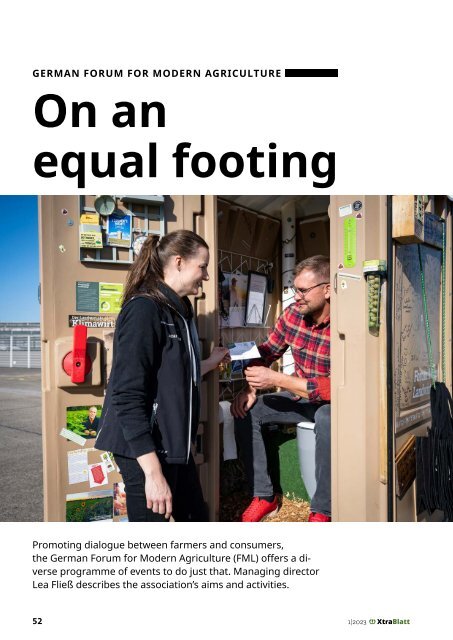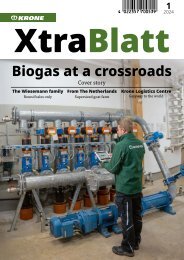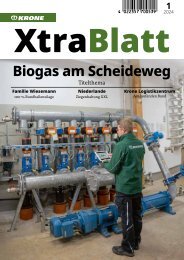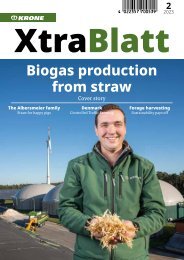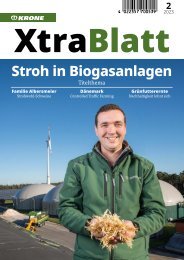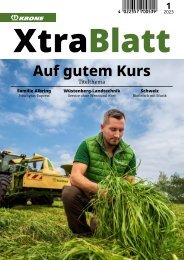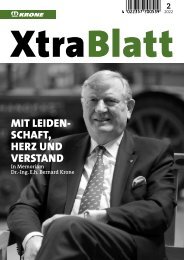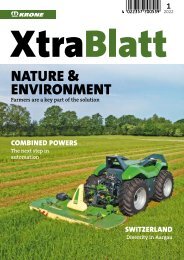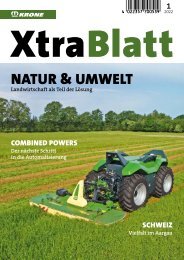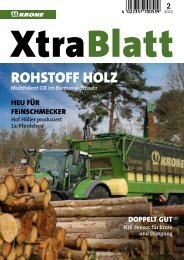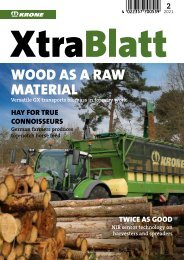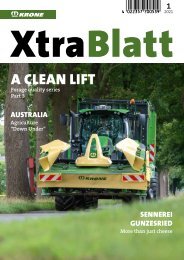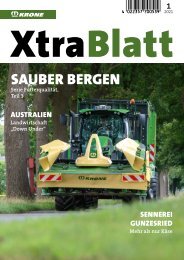XtraBlatt Issue 01-2023
You also want an ePaper? Increase the reach of your titles
YUMPU automatically turns print PDFs into web optimized ePapers that Google loves.
GERMAN FORUM FOR MODERN AGRICULTURE<br />
On an<br />
equal footing<br />
<strong>XtraBlatt</strong>: Ms Fließ, what topics are the main<br />
focus of the Forum for Modern Agriculture’s<br />
events?<br />
Lea Fließ: We cover all topics of farming – from<br />
pumpkin growing, loose housing and from arable<br />
farming to livestock husbandry. But we are also<br />
very much guided by what matters to consumers.<br />
In our experience, there are essentially three areas<br />
to address. Firstly, how are the livestock treated<br />
and what are farmers doing to protect nature?<br />
Secondly, we are constantly raising the issue of<br />
security of supply, because this is something<br />
consumers rarely consider, although that has<br />
changed since the war in the Ukraine. We want<br />
to show that farming connects everything: it<br />
supplies people with food and manages sustainably<br />
for nature and the animals. And thirdly, the<br />
subject of nutrition regularly crops up in our<br />
activities and is illustrated from various angles.<br />
Yet, we do not take a stance on diets. This is something<br />
everyone must decide for themselves.<br />
<strong>XtraBlatt</strong>: The association’s activities are paid<br />
for by the members. Who are they?<br />
Lea Fließ: We currently have 66 members. Half<br />
of them are associations and the other half are<br />
businesses, mainly from the upstream agricultural<br />
sector. For example, the German Farmers’<br />
Association (DBV), the German Agricultural<br />
Society (DLG) and the Raiffeisenverband (the<br />
German umbrella association for agricultural<br />
cooperatives), as well as larger companies and<br />
small businesses.<br />
Scouts sind ehrenamtlich tätig. They receive one<br />
day’s training on how to communicate rather<br />
than what to communicate. We show them how<br />
important it is to listen first and to find out what<br />
the other person knows rather than bombarding<br />
them with figures. They should talk about their<br />
work on the farm and what they do each day. We<br />
find that this format works very well – both for the<br />
farmers and for the general public.<br />
<strong>XtraBlatt</strong>: What kind of activities and events<br />
do you offer people locally?<br />
Lea Fließ: The ten members of our core team are<br />
creative experts in the fields of communication,<br />
events management and agriculture. We try to<br />
offer something new every year. Our marketplace<br />
events are a well-proven format for starting a<br />
conversation with the public. For example, we<br />
organised a discovery tour, which involved travelling<br />
around the country with a small info bus.<br />
On another occasion, we took a couple of tractors<br />
to a location in the centre of Berlin and invited<br />
residents to go for a spin. As it rained all day, we<br />
drove the people back home with their shopping<br />
and so had plenty of time to chat. We also set up<br />
the world’s smallest agricultural climate exhibition<br />
in a portaloo – dubbed the Klimaklo. This was<br />
another of our marketplace campaigns. <br />
Profile<br />
Lea Fließ is the<br />
managing director of<br />
the Forum for Modern<br />
Agriculture which she<br />
joined in 2<strong>01</strong>5.<br />
One campaign of the<br />
Forum For Modern<br />
Agriculture is the<br />
interactive exhibition<br />
titled “Klimaklo” – the<br />
world’s smallest<br />
agricultural exhibition<br />
on climate change.<br />
<strong>XtraBlatt</strong>: What are the aims of the Forum?<br />
Lea Fließ: We want to give the many stakeholders<br />
in the agricultural industry and the upstream<br />
sector an opportunity to engage in dialogue with<br />
the general public. We give consumers fascinating<br />
insights into the industry and show what agriculture<br />
is really like today. Our industry has been<br />
on a path to greater sustainability for several years<br />
now. In order to succeed in this transformation,<br />
it needs the approval of the public – and that’s<br />
where we come in. Large parts of the general<br />
public and the media are still unaware of many of<br />
the positive contributions the farming industry<br />
makes to society and the environment.<br />
Promoting dialogue between farmers and consumers,<br />
the German Forum for Modern Agriculture (FML) offers a diverse<br />
programme of events to do just that. Managing director<br />
Lea Fließ describes the association’s aims and activities.<br />
<strong>XtraBlatt</strong>: You use AgrarScouts for many of<br />
your campaigns. Who are these people and what<br />
do they do?<br />
Lea Fließ: The idea of AgrarScouts first came<br />
about at our educational agricultural Event Farm<br />
programme at the Grüne Woche show in Berlin<br />
in 2<strong>01</strong>6. There are now 800 of these volunteer<br />
“agri scouts” – quite a large network of farmers<br />
and trainees from different companies. Die<br />
The German Forum for Modern Agriculture stages talks of its “AgrarScouts”<br />
with the public at prominent locations in towns and cities. The photo shows<br />
them at the Berlin Food Week.<br />
52 1|<strong>2023</strong> <strong>XtraBlatt</strong><br />
<strong>XtraBlatt</strong> 1|<strong>2023</strong><br />
53


